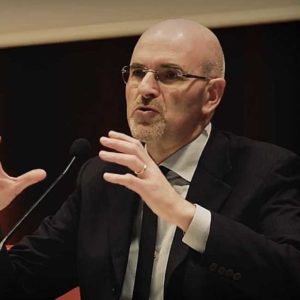 ROME — The Vatican’s Apostolic Penitentiary has issued a decree granting special plenary indulgences, that is, full elimination of temporal punishment in Purgatory for a forgiven sin, during the “Year of St. Joseph.” The practice, which dates back to medieval times, has been deemed unbiblical by evangelicals.
ROME — The Vatican’s Apostolic Penitentiary has issued a decree granting special plenary indulgences, that is, full elimination of temporal punishment in Purgatory for a forgiven sin, during the “Year of St. Joseph.” The practice, which dates back to medieval times, has been deemed unbiblical by evangelicals.
On Dec. 8, Jorge Bergoglio, also known as “Pope Francis,” announced a special “Year of St. Joseph” to mark the 150th anniversary of Pope Pius IX’s proclamation of Joseph, the earthly father of Jesus, as the “patron of the Universal Church.”
He made the announcement in a Patris Corde (translated “Heart of the Father”) letter on the Feast of Immaculate Conception, which, as previously reported, commemorates the Catholic belief that Mary never sinned and was conceived without a sin nature.
Bergoglio explained that every morning, he recites a prayer to Joseph that ends with, “My beloved father, all my trust is in you. Let it not be said that I invoked you in vain, and since you can do everything with Jesus and Mary, show me that your goodness is as great as your power.”
He also penned his own prayer, which asks for Joseph to “show yourself a father and guide us in the path of life.”
The Apostolic Penitentiary, a tribunal relating to the forgiveness of sins, also issued a decree in conjunction with the “Year of St. Joseph” to “perpetuate the entrustment of the whole Church to the powerful patronage of the custodian of Jesus.”
According to Vatican News, the proclamation stated that Catholics will have an occasion “with prayer and good works, to obtain, with the help of St. Joseph, head of the heavenly family of Nazareth, comfort and relief from the serious human and social tribulations that besiege the contemporary world today.”
It announced that as devotion to Joseph has increased through the years, plenary indulgences will be made available throughout the year.
According to the Indulgentarium Doctrina signed by Pope Paul VI in 1967, “[a]n indulgence is a remission before God of the temporal punishment due to sins whose guilt has already been forgiven, which the faithful Christian who is duly disposed gains under certain defined conditions through the Church’s help when, as a minister of redemption, she dispenses and applies with authority the treasury of the satisfactions won by Christ and the saints.”
While Catholics agree that sins are forgiven through Christ’s death on the cross, they also believe that those sins still must be cleansed after death — that saved souls are held in Purgatory for an unknown amount of time to be purified before they can enter Heaven.
The Catechism of the Catholic Church, paragraphs 1030 and 1031, claim, “All who die in God’s grace and friendship, but still imperfectly purified, are indeed assured of their eternal salvation; but after death they undergo purification, so as to achieve the holiness necessary to enter the joy of Heaven. The Church gives the name Purgatory to this final purification of the elect, which is entirely different from the punishment of the damned.”
The Vatican therefore offers “indulgences,” a reduction of one’s time in Purgatory, in exchange for specific acts of penance and piety that must be conducted with “total detachment from sin.” They can be plenary — meaning in full — or partial. Indulgences relate only to past sins and not sins to be committed in the future.
Denver Catholic outlines that indulgences can also apply to the dead who died in faith and not just oneself. One indulgence may be obtained per day.
“Remember, the only living person we can apply it to is our self. And we can apply it to any soul in Purgatory,” it writes. “Think how many souls you get [to] help — from relatives to unknowns by asking St. Joseph and Mary to pick out the souls for you.”
Indulgences were one of the key contentions that sparked the Protestant Reformation during the 16th century through the efforts of Martin Luther, a monk who served the Roman Catholic Church in Wittenburg, Germany, as indulgences were then provided in exchange for alms.
The Apostolic Penitentiary enumerated the conditions in which plenary indulgences would be granted through Dec. 8, 2021, which includes meditating on the Lord’s Prayer for at least 30 minutes or going on a spiritual retreat that includes a meditation on Joseph. Praying the Litany to St. Joseph for the persecuted, or other approved prayer to Joseph, or reciting the rosary among families will also qualify for an indulgence.
“Everyone who entrusts their daily activity to the protection of St. Joseph, and every faithful who invokes the intercession of St. Joseph so that those seeking work can find dignifying work can also obtain the plenary indulgence,” Vatican News reports.
IS IT BIBLICAL?

Christian News Network reached out to Leonardo De Chirico, the pastor of Breccia di Roma in Italy, leader of the Reformanda Initiative, and the vice chairman of the Italian Evangelical Alliance to inquire about the concept that one can seek intercession from a deceased Joseph and the practice of obtaining indulgences.
He explained that the Catholic Church bases such prayers on its interpretation of Article 9 of the Apostles’ Creed, which states, “We believe in the communion of the saints.”
“For Catholics, that ‘communion’ is extended to the dead and allows communication to them in terms of prayers and petitions addressed to them,” De Chirico stated. “On the other hand, it is based on the Catholic view of the saints who, because of their heroic witness, can be ‘mediators’ between God and humanity.”
However, the teaching is unbiblical, he said, as “our fellowship with those who have preceded us in glory is spiritual until resurrection comes and we are never commanded to pray to the dead.”
“We are called to imitate their faith (Hebrews 13:7). It is actually forbidden by Scripture to have anything to do with the realm of the dead (Deuteronomy 18:10-12),” De Chirico outlined. “Plus, we have a living and loving intercessor in the Person of Jesus Christ who perfectly hears our prayers (Hebrews 4:15-16) and who is perfectly qualified to be the only mediator between God and us (1 Timothy 2:5). If we don’t know what to pray and how to pray, we have the Holy Spirit who helps us to pray (Romans 8:26).”
He noted that indulgences likewise are not Scriptural as Jesus already took upon Himself the punishment for our sins (Isaiah 53:5,8), and there is therefore no “temporal punishment due to sins” that those who are forgiven through Christ’s sacrifice must pay in the afterlife.
“Indulgences are a medieval invention that has nothing to do with Scripture,” De Chirico said. “They stem from a works-based view … whereby we must do something to have our sins [cleansed] from us (e.g. reciting certain prayers, making certain pilgrimages, crossing the holy doors, in the past paying an amount of money to buy them).”
“They derive from a faulty view of the Church, who claims to administer God’s grace by way of opening up the ‘treasury of merits’ earned by the saints and made available by the Roman Church on special occasions,” he outlined. “The forgiveness of our sins is a gift that comes to us by grace alone and it is grounded on the accomplished work of the Lord Jesus Christ, who has paid the full penalty for our sins (1 John 2:1-2).”
De Chirico, who works to equip Christians with the tools to knowledgeably engage Roman Catholics, expressed his sorrow that the Vatican is leading the masses in false doctrine.
“It is a tragedy that the Roman pope, instead of directing people to Christ according to the biblical gospel, teaches them to look for help elsewhere and invites them to pray to someone who cannot hear, let alone act upon those requests,” he said.
“I thank God we can go directly to the Father’s throne in the name of the Son and by the power of the Holy Spirit. This is the way that Joseph and Mary followed, and every believer should initiate them.”
1 John 1:7 says, “But if we walk in the light, as He is in the light, we have fellowship one with another, and the blood of Jesus Christ His Son cleanseth us from all sin.”
Become a Christian News Network Supporter...


